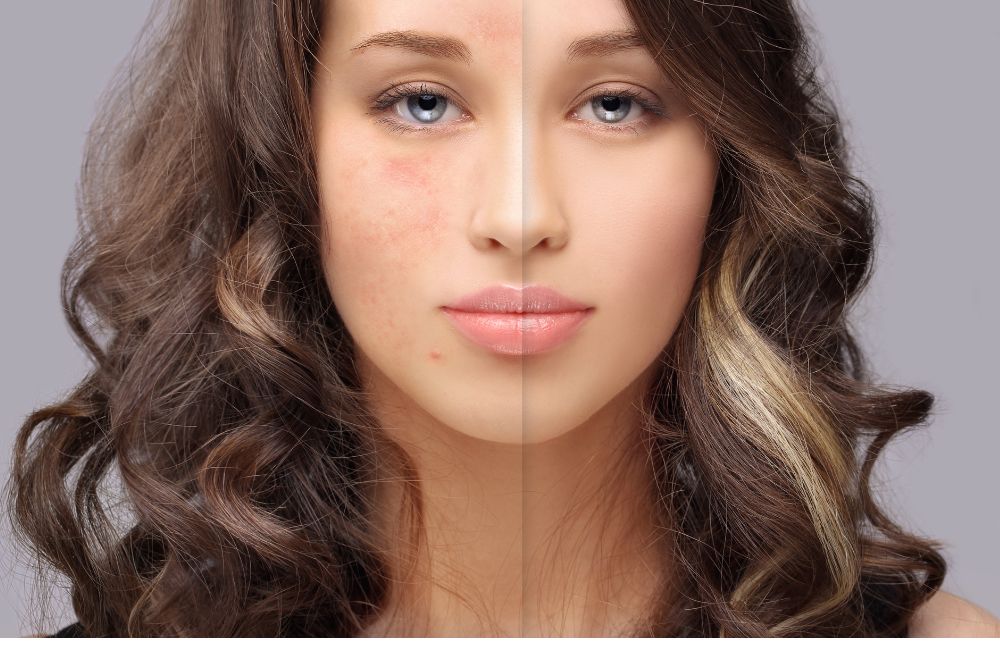
Bid Adieu to Acne Scars: Understanding, Treating, and Preventing Them!
Overview
Acne scars are the lingering aftermath of acne breakouts. When pimples or blemishes penetrate the skin deeply, they can damage the underlying tissue, resulting in scars. These scars can appear in various forms, such as ice-pick, boxcar, rolling, or hypertrophic scars, impacting an individual’s self-esteem and confidence.
QUICK LINKS:
What it is
Acne scars are skin blemishes left behind by severe acne. When the skin pores become clogged with oil, dead skin cells, or bacteria, inflammation occurs. This inflammation can lead to the breakdown of collagen, leaving scars on the skin.
How it works
When the skin undergoes trauma due to severe acne, the body attempts to repair itself by producing collagen. However, sometimes this process is uneven, resulting in the formation of scars.
Symptoms
Acne scars can manifest as discolored marks, raised or depressed areas on the skin, or uneven texture. These scars may cause emotional distress, affecting one’s confidence and mental well-being.
How to get help
If acne scars cause emotional distress or affect your quality of life, it’s advisable to seek help from a dermatologist or skincare professional. They can assess the severity of the scars and recommend suitable treatment options.
| Treatment Options | Description |
|---|---|
| Chemical Peels | Help in skin exfoliation and improve skin texture. |
| Microneedling | Stimulates collagen production, reducing scars. |
| Laser Therapy | Targets scarred areas to promote skin regeneration. |
| Dermal Fillers | Fill in depressed scars, giving a smoother appearance. |
| Topical Treatments | Creams or gels to reduce scar appearance over time. |
Historical Context:
Acne and its scars have been a concern for centuries. Historical records reveal various remedies and treatments used across cultures to combat acne and its effects. Traditional methods often involved herbal remedies and natural ingredients.
Other Factors:
Apart from acne, several factors contribute to the development of scars, including genetics, skin type, improper skincare routines, picking or squeezing acne, and delayed or inadequate treatment.
Understanding the psychological impact of acne scars is crucial. It can significantly affect an individual’s self-esteem, social interactions, and mental health.
When considering treatment, it’s essential to consult professionals to determine the best approach based on scar type, severity, and individual skin characteristics.
Conclusion
Acne scars can be emotionally distressing, impacting self-confidence. However, with advancements in skincare treatments and professional guidance, managing and minimizing their appearance is possible. Remember, seeking help and adopting a consistent skincare routine can make a significant difference in managing acne scars.
FAQs:
Acne scars may fade over time, but they usually require specific treatments to diminish significantly.
Some natural remedies like aloe vera, honey, or rosehip oil might help improve the appearance of scars, but results vary individually.
Proper skincare, avoiding picking or squeezing pimples, and early treatment of acne can minimize the risk of scarring.
No, acne scars come in various forms—ice pick, boxcar, rolling, or hypertrophic scars—each requiring different treatments.
Laser treatments are generally safe when performed by qualified professionals, but individual responses may vary.
The duration varies depending on the treatment method and individual skin response, ranging from several weeks to months.
In some cases, new acne breakouts may lead to new scars, emphasizing the importance of ongoing skincare routines.
Using makeup to conceal scars is okay, but it’s crucial to choose non-comedogenic products to avoid aggravating acne.
Acne scars can appear at any age after experiencing severe acne, often persisting from adolescence into adulthood.
Some over-the-counter products may help improve the appearance of scars, but professional guidance is advisable for severe cases.
